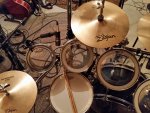You are using an out of date browser. It may not display this or other websites correctly.
You should upgrade or use an alternative browser.
You should upgrade or use an alternative browser.
cleaning cymbals
- Thread starter Atkron205
- Start date
miroslav
Cosmic Cowboy
I'm sure the drummer guys, like Greg, have it down to a science...but I wanted to just toss out my own process, because even though I'm not a drummer, I have the studio kit and I like to keep the cymbals clean.
OK...so since I bought a lot of used cymbals over the years in order to find what I liked, and then I sold the ones I didn't...most of them came with smudges, oxidation and some with a heavy patina.
To remove all that grime, I just used Brasso and a green scrubby, which does a great job, but leaves it's own black grime (oh, and it WILL remove any printed lettering if you push it too hard...so work around that stuff if the lettering is imporatn to you)_.
After the Brasso, I did like what Greg said above...warm water and soap, and that removes all the Brasso gunk and leaves a nice shiny cymbal.
Now here is where I added my own twist to the process.
My drummer complained how even after cleaning cymbals, as soon as you grab them, you leave new fingerprints.
So I thought about it for a bit, and on a hunch, decided to put down a coat of car wax on them.
It worked out quite well.
The car wax resists new fingerprints, and it has kept the cymbals shiny for a long time now, and free of oxidation....and it's been awhile.
I think I just used your basic Turtle Wax on them...the white cream paste. One coat, buff it off with a dry rag, and done.
There was no negative effect on the sound of the cymbals that I could tell.
YMMV....
OK...so since I bought a lot of used cymbals over the years in order to find what I liked, and then I sold the ones I didn't...most of them came with smudges, oxidation and some with a heavy patina.
To remove all that grime, I just used Brasso and a green scrubby, which does a great job, but leaves it's own black grime (oh, and it WILL remove any printed lettering if you push it too hard...so work around that stuff if the lettering is imporatn to you)_.
After the Brasso, I did like what Greg said above...warm water and soap, and that removes all the Brasso gunk and leaves a nice shiny cymbal.
Now here is where I added my own twist to the process.
My drummer complained how even after cleaning cymbals, as soon as you grab them, you leave new fingerprints.
So I thought about it for a bit, and on a hunch, decided to put down a coat of car wax on them.
It worked out quite well.
The car wax resists new fingerprints, and it has kept the cymbals shiny for a long time now, and free of oxidation....and it's been awhile.
I think I just used your basic Turtle Wax on them...the white cream paste. One coat, buff it off with a dry rag, and done.
There was no negative effect on the sound of the cymbals that I could tell.
YMMV....

If you want to clean an old dingy cymbal, the brasso/car wax is a good idea. Keep in mind that most old dingy cymbals have a sound character that might go away once you clean it off. An dark, aged cymbal usually has a warmer less brittle tone. But if you hit it with brasso, it will come clean, but you definitely should protect it with something afterwards. Many cymbals come with a protective coating, and it lasts even when dirty. Brasso will strip that coating and leave the cymbal material raw and exposed leading to quicker gunk build up, patina, and potential damage. An oily, sweaty smudge or fingerprint on a raw cymbal is a bad thing.
Atkron205
Member
If you want to clean an old dingy cymbal, the brasso/car wax is a good idea. Keep in mind that most old dingy cymbals have a sound character that might go away once you clean it off. An dark, aged cymbal usually has a warmer less brittle tone. But if you hit it with brasso, it will come clean, but you definitely should protect it with something afterwards. Many cymbals come with a protective coating, and it lasts even when dirty. Brasso will strip that coating and leave the cymbal material raw and exposed leading to quicker gunk build up, patina, and potential damage. An oily, sweaty smudge or fingerprint on a raw cymbal is a bad thing.
yeah, the twinkle I have used for years has some sort of anti tarnish stuff in it. I did find it on amazon. its pretty good stuff. Thanks
miroslav
Cosmic Cowboy
Yeah..I'm sure the Brasso strips off any special coating that might have been there.
For my cymbals, I was interested in cleaning them back to an almost new shine. I wasn't buying them for the sound they had when they were dingy and all smudged up.
I mean....these were not very old, "aged" cymbals...most were just dirty from improper care by the previous owners.
So for my case the Brasso was the option.
I mean, I tried just cleaning them lightly, and that just wasn't going to restore the original shine.
Anyway..I kinda guessed at the car wax thing, it just seemed logical that it would work since it was meant to protect metal.-n-plaint on cars. I've just been surprised at how long it's kept them clean and shiny with just that one wax application.
For my cymbals, I was interested in cleaning them back to an almost new shine. I wasn't buying them for the sound they had when they were dingy and all smudged up.
I mean....these were not very old, "aged" cymbals...most were just dirty from improper care by the previous owners.

So for my case the Brasso was the option.
I mean, I tried just cleaning them lightly, and that just wasn't going to restore the original shine.
Anyway..I kinda guessed at the car wax thing, it just seemed logical that it would work since it was meant to protect metal.-n-plaint on cars. I've just been surprised at how long it's kept them clean and shiny with just that one wax application.
Atkron205
Member
Most of the drummers I've known either keep them clean as a whistle, wiping them down after every use and putting them in cases, or just bashed on them and let them age.
Once they'd crack, I'd drill em. When they cracked again, they'd give em to me.
I make guitar picks out if them. Paiste sound and feel the best, but turn your fingers green after a long gig.

But for cleaning the nasty ones, a German product called flitz works well. That and this stuff in a can. Dont remember the name, but it's almost like cotton candy. You pull out tufts of it and polish away.
Anyone know the name? Its in a round blue metal can.
And like Miro said, wax. I always used some paste wax.
Once they'd crack, I'd drill em. When they cracked again, they'd give em to me.
I make guitar picks out if them. Paiste sound and feel the best, but turn your fingers green after a long gig.

But for cleaning the nasty ones, a German product called flitz works well. That and this stuff in a can. Dont remember the name, but it's almost like cotton candy. You pull out tufts of it and polish away.
Anyone know the name? Its in a round blue metal can.
And like Miro said, wax. I always used some paste wax.
Last edited:
my kit stayed in the cases for 17 years, I just bought some new cymbals for the 1st time in 25 years. I was really surprised at how good mine looked after all that time. I still have not cleaned my hats since about 95. the hats and the crash in the pic were bought new in 85, last cleaned in 95.
View attachment 94842
Those look brand new. I'd suggest you NOT brasso those things. Those are good candidates for just regular ol soap and water.
miroslav
Cosmic Cowboy
Those look brand new. I'd suggest you NOT brasso those things. Those are good candidates for just regular ol soap and water.
I would agree. They look great.
The used ones I was dealing with were much more grimy and needed more serious cleaning effort...but then, the prices were good...and now they all look like brand new.


miroslav
Cosmic Cowboy
Naaa...my drummer is a lefty. 
Which actually works out better for me...as I don't get into all the audience VS drummer's perspective stuff.
I mean, I mic/flip the kit in the mix so the hat is on the right side of the mix...and for him sitting at the kit, that's also how he hears it....and that's also how the audience would hear it IF it was a right-handed drummer (they'll never know he was a lefty).

Which actually works out better for me...as I don't get into all the audience VS drummer's perspective stuff.
I mean, I mic/flip the kit in the mix so the hat is on the right side of the mix...and for him sitting at the kit, that's also how he hears it....and that's also how the audience would hear it IF it was a right-handed drummer (they'll never know he was a lefty).

Naaa...my drummer is a lefty.
Which actually works out better for me...as I don't get into all the audience VS drummer's perspective stuff.
I mean, I mic/flip the kit in the mix so the hat is on the right side of the mix...and for him sitting at the kit, that's also how he hears it....and that's also how the audience would hear it IF it was a right-handed drummer (they'll never know he was a lefty).
Not to mention no one actually gives a fuck about that stuff except for retarded home recorders.
miroslav
Cosmic Cowboy
Not to mention no one actually gives a fuck about that stuff except for retarded home recorders.
Yeah.
That's why I threw that in there...'cuz I know how many "audience VS drummer perspective" threads there've been around here.


It just never mattered much to me.
I always set the L/R image of the kit based on how *I* like to hear it in the mix....not the drummer or anyone else.

Tadpui
Well-known member
There needs to be one definitive drummer vs audience perspective vs analog vs digital thread. Everyone will be wrong and the internet will finally actually break.
Add a little PC vs. Mac in there and it could be the ultimate thread.


